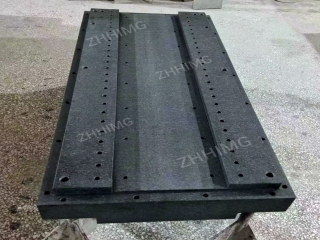The Rise of Precision Granite Components in Modern Applications
In the realm of precision engineering, the choice of materials plays a pivotal role in determining the performance and longevity of components. Traditionally, metals such as steel and aluminum have been the go-to materials for various applications. However, in recent years, precision granite components have increasingly replaced these traditional metal materials in specific applications, bringing with them a host of significant advantages.
Applications of Precision Granite Components
Precision granite components are now widely used in several high-precision applications, including:
1. Coordinate Measuring Machines (CMMs):Granite is extensively used for the base and structural components of CMMs due to its superior dimensional stability.
2. Machine Tool Bases: Granite bases are preferred in high-precision machine tools, such as CNC machines, where stability and vibration damping are crucial.
3. Optical Equipment: In optical instruments and laser systems, granite components provide a stable platform that minimizes thermal expansion and vibration.
4. Surface Plates:Granite surface plates are essential in metrology labs for calibration and inspection tasks, offering a flat and stable reference surface.
Advantages of Using Granite Over Metal
The substitution of traditional metal materials with precision granite components brings several significant advantages:
1. Dimensional Stability: Granite exhibits minimal thermal expansion compared to metals. This property ensures that components remain dimensionally stable even under varying temperature conditions, which is critical for high-precision applications.
2. Vibration Damping: Granite has excellent natural vibration damping characteristics. This reduces the transmission of vibrations, leading to more accurate measurements and machining processes.
3. Corrosion Resistance: Unlike metals, granite is inherently resistant to corrosion and does not require additional coatings or treatments, reducing maintenance costs and extending the lifespan of components.
4. Wear Resistance:Granite is highly resistant to wear and abrasion, making it ideal for applications where long-term durability is essential.
5. Cost-Effectiveness:While the initial cost of granite components may be higher, their longevity and reduced maintenance requirements often result in lower total cost of ownership over time.
In conclusion, the adoption of precision granite components in place of traditional metal materials in specific applications offers numerous advantages, including enhanced dimensional stability, superior vibration damping, and increased durability. As technology continues to advance, the use of granite in precision engineering is likely to expand, further solidifying its role as a cornerstone material in high-precision applications.
Post time: Sep-14-2024

